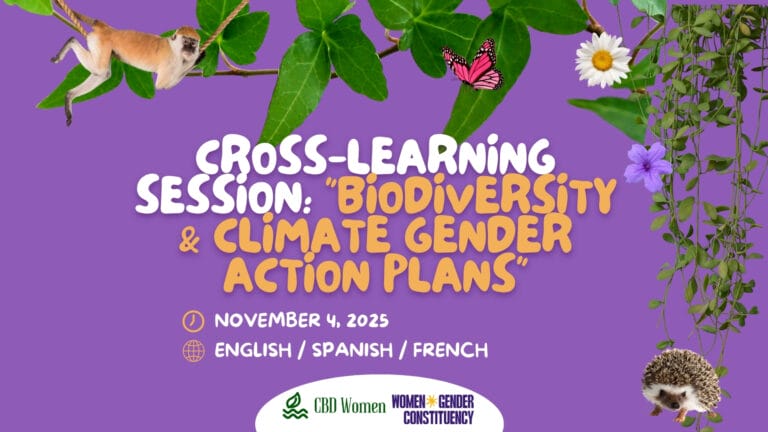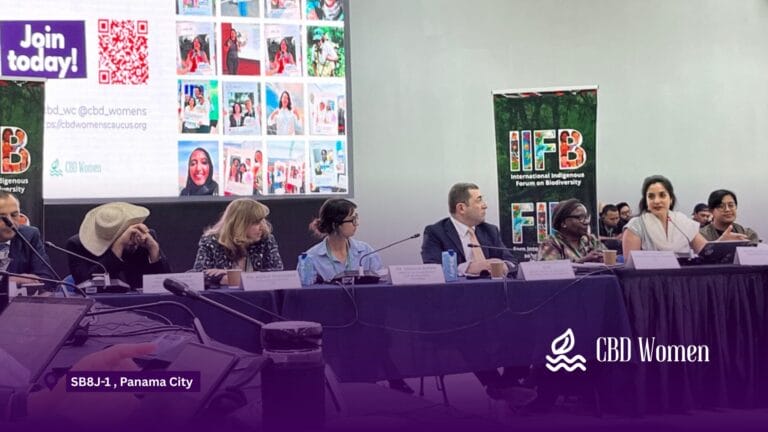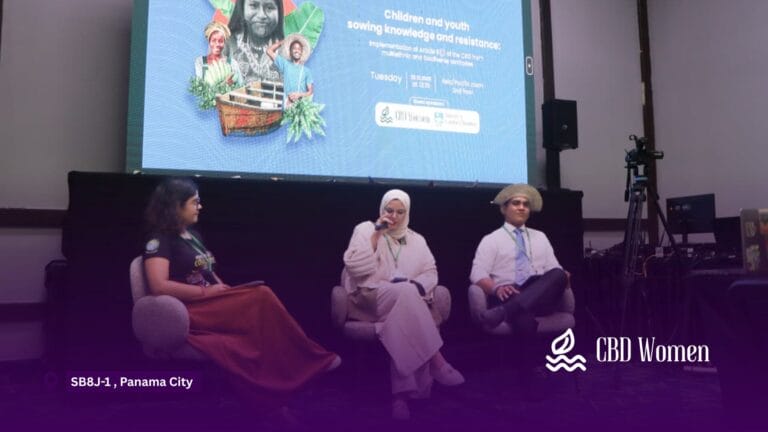By Sol Parra Santos, biologist, PhD student at McGill University, and Nancy Marangu, Chemichemi Foundation; CBD Women’s Caucus members
What does it really take to protect our planet from the risks of living modified organisms (LMOs)? The CBD Open-ended Online Forum on Risk Assessment and Risk Management brought together governments, scientists, women and youth groups, Indigenous Peoples, civil society, and local communities to find out.
From April 21 to May 9, 2025, this forum sparked powerful conversations that showed that risk assessment is not just a technical issue; it is about the lives of women in Indigenous Peoples and local communities who stand on the frontlines of biodiversity protection.
Why women’s voices matter in biosafety
The CBD Women’s Caucus played a pivotal role in keeping gender justice at the forefront throughout the forum, guided by the Gender Plan of Action and Target 23.
Women and girls, especially those from Indigenous Peoples and local communities, maintain a profound connection to the land and biological resources. Their traditional knowledge and everyday interactions with nature provide vital insights into sustainable biodiversity management.
The Caucus’s active engagement highlighted the often-overlooked social, cultural, and health impacts of Living Modified Organisms (LMOs) on women and girls and their communities, bringing these critical issues into biotechnology discussions.
By advocating for transparent, precautionary, and equitable biosafety policies, the CBD WC amplified community voices and helped foster a governance process that is more legitimate, inclusive, and effective. Representatives of the CBD WC at this forum included Ms. Sol Parra Santos (Colombia) and Ms. Nancy Marangu (Kenya). These women represented the Caucus with expertise, passion, and a firm commitment to equitable biosafety policies.
Event Highlights and Discussions
Throughout the forum’s thematic weeks, The CBD WC members made strategic interventions to highlight the value of gender-responsive approaches, traditional knowledge systems, and community-driven governance. The structure encouraged participants to share inputs based on weekly topics, and the CBD WC made sure the perspectives of women and girls from the grassroots communities weren’t just heard but included meaningfully
Key Topics Insights included :
🔹 Living Modified Algae and Animals
Discussions revealed how current biosafety frameworks fall short in addressing aquatic LMOs. Issues like rapid reproduction, gene flow, and ethical concerns were raised. The CBD WC emphasized the need for inclusive models that respect gender perspectives and traditional knowledge
🔹 Living Modified Fish
From commercial farming to ornamental use, genetically modified fish pose risks to local biodiversity and economies. The CBD WC called for mandatory biocontainment, producer accountability, and better communication with consumers.
🔹 Stacked Events & New Genomic Techniques
With stacked traits and molecular technologies becoming more common, the absence of international guidance is alarming. The CBD WC warned of threats to food sovereignty and dependence on patented seeds, urging risk assessments to consider unintended gene interactions.
🔹 Genome Editing & Synthetic Biology
Emerging biotech tools like gene editing require updated risk frameworks. The CBD WC advocated integrating Indigenous ecological knowledge, gender analysis, and creative education tools like storytelling and gamification.
🔹 LMOs in Food Systems & Centres of Origin
The threat of genetic contamination in biodiversity hotspots was a major concern. The CBD WC supported locally developed, non-patented LMOs aligned with community values and food sovereignty.
🔹 Detection, Monitoring & Protection Goals
Weak biosafety infrastructure, especially in the Global South, weakens community protection. The CBD WC stressed the need for gender-sensitive monitoring, institutional support for women, girls, and measurable, inclusive protection goals.
Looking ahead: from dialogue to action
The forum offered more than just discussion; it laid the groundwork for change. The voices and expertise of CBD Women’s Caucus members helped spotlight urgent biosafety challenges that affect vulnerable groups, including women and girls, especially from the Global South. Their contributions will feed directly into the upcoming Ad Hoc Technical Expert Group (AHTEG) on Risk Assessment, set to meet in Montreal, Canada, from July 8–11, 2025.
This meeting is a critical moment to embed equity, inclusion, and justice into the DNA of global biotechnology policies.
Disclaimer: The views expressed in this blog are those of the author and do not necessarily reflect the official position or opinions of the CBD Women’s Caucus.




